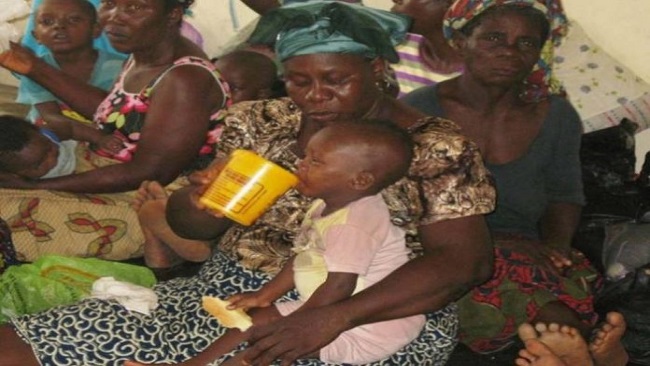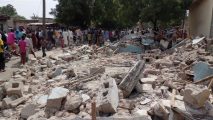6, May 2019
US says sending ‘strike group’ to Middle East as ‘clear message’ to Iran 0
The United States is sending an aircraft carrier strike group and a bomber task force to the Middle East in a “clear and unmistakable” message to Iran, declared John Bolton, the hawkish US national security advisor.
“The United States is deploying the USS Abraham Lincoln Carrier Strike Group and a bomber task force to the US Central Command region,” Bolton said in a Sunday statement.
The move, he said, is aimed at sending a “clear and unmistakable message” to Iran that “any attack on United States interests or on those of our allies will be met with unrelenting force.”
Bolton said the decision was “in response to a number of troubling and escalatory indications and warnings.”
He said the US “is not seeking war” with Iran, but it is “fully prepared to respond to any attack”, whether by proxy, the Islamic Revolution Guards Corps (IRGC) or regular Iranian forces, Bolton said in a statement.

Bolton did not provide any further details, but a US official said the forces “have been ordered to the region as a deterrence to what has been seen as potential preparations by Iranian forces and its proxies that may indicate possible attacks on US forces in the region.”
The official, speaking on the condition of anonymity, said the United States was not expecting any imminent attack on US forces, Reutersreported.
The move by the US comes as it had earlier vowed to cut Iran’s oil exports down to zero, prompting Tehran to warn that it will not allow any other country to export oil through the Strait of Hormuz if Tehran cannot sell its crude.
Meanwhile, the deployment seems to be a “regularly scheduled” one by the US Navy, and Bolton has just tried to talk it up.
Back on April 8, the USS Abraham Lincoln Carrier Strike Group (ABECSG) Public Affairs announced that the Strike Group has departed a naval station in Virginia on April 1 for “a regularly scheduled deployment.”
Therefore, what Bolton describes as a “response” to Iran’s warning does not seem to be genuine, as the ABECSG started its mission long before Iran’s warning.
Back on Saturday, Iranian Foreign Minister Mohammad Javad Zarif said Iran does not seek to escalate tensions with the United States, but it will not let Washington disrupt the security of Persian Gulf, the “lifeline of Iran”.
“We have been very clear that we have no interest in escalation,” Zarif said in an exclusive interview with Al Jazeera TV.
“We have been clear that the Persian Gulf and the Strait of Hormuz are our lifeline. We depend on them for our livelihood, and we want them safe, secure, and free for navigation of all countries, including Iran,” he said.
“As we have stated before, Iran won’t permit the US to threaten the Persian Gulf,” the foreign minister added.

Last Sunday, Iran’s top military commander said Iran wants the strait — through which nearly one-third of all oil traded by sea passes — to remain open and secure, warning that the country will not allow anyone to destabilize the waters.
“As oil and commodities of other countries are passing through the Strait of Hormuz, ours are also moving through it,” said Chairman of the Chiefs of Staff of the Iranian Armed Forces Major General Mohammad Baqeri.
Iran “will definitely confront anyone who attempts to destabilize the Strait of Hormuz, and if our crude is not to pass through the Strait of Hormuz, others’ [crude] will not pass either.”
The Iranian commander explained, “This does not mean [that we are going to] close the Strait of Hormuz. We do not intend to shut it unless the enemies’ hostile acts will leave us with no other option. We will be fully capable of closing it on that day.”

The US administration said in a statement on April 22 that buyers of Iranian oil must stop their purchases by May 1 or face sanctions. The move ended six months of waivers, which allowed Iran’s eight biggest buyers — Turkey, China, Greece, India, Italy, Japan, South Korea and Taiwan — to continue importing limited volumes.
Source: Presstv






























7, May 2019
Southern Cameroons War: Rights group condemns torture, illegal detention of Ambazonians 0
The human rights organization Human Rights Watch (HRW) denounced in a report published on Monday “a regular use of torture and illegal detention” by the Cameroonian authorities against English-speaking separatists.
HRW claims to have “documented 26 cases of illegal detention and enforced disappearance at the detention centre of the Secretariat of State for Defence between January 2018 and January 2019, including 14 cases of torture”.
The 26 cases concern English-speaking separatists or persons suspected of being so, HRW added. Gendarmes and other security forces at the State Secretariat of Defense (SED) used severe beatings and near-drownings to obtain confessions.
Among them, “ten were leaders of the self-proclaimed Ambazonia interim government,” the NGO detailed.
The English-speaking separatists of Cameroon, a country with a French-speaking majority, are campaigning for the creation of an independent state in the North-West and South-West regions on behalf of Ambazonia.
At the end of 2017, after a year of protest, separatists took up arms against Yaoundé. Since then, these regions have been the scene of an armed conflict that has continued to grow.
“Gendarmes and other security forces at the State Secretariat of Defense (SED) used severe beatings and near-drownings to obtain confessions,” the NGO said in its publication. In this report, HRW also cites cases of torture inflicted by separatists on civilians.
On Wednesday, the Ministry of Defense denounced on Facebook the “guilty silence and complicity of Human Rights Watch, Amnesty International and the international media” in the face of abuses committed by separatists against civilians.
In mid-April, a HRW researcher working on the conflict in the English-speaking area was denied entry to Cameroon at Douala airport.
In twenty months, the conflict in the English-speaking area has killed 1,850 people, according to the International Crisis Group, a centre for geopolitical analysis. It has already forced more than 530,000 people to flee their homes, according to the UN.
At the initiative of the United States, the UN Security Council will hold its first meeting on the crisis in English-speaking Cameroon on May 13, which will focus on the humanitarian situation.
“The UN Security Council should send a clear message that ending torture in detention is crucial to responding to the crisis in English-speaking regions,” HRW commented in its report on Monday.
On Thursday, Michelle Bachelet, the UN High Commissioner for Human Rights, arrived in Cameroon for a four-day visit, where she met with President Paul Biya on Friday.
Source: AFP